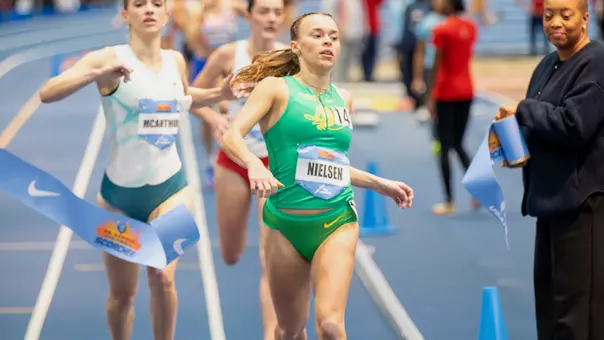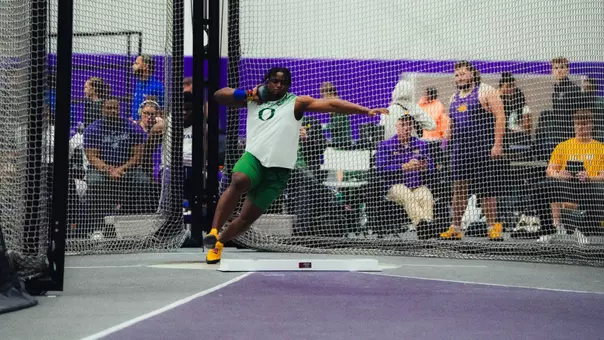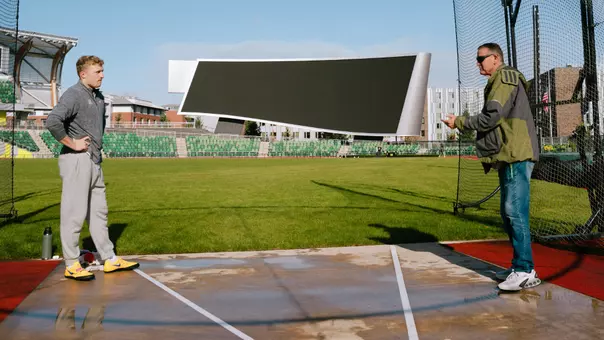
Photo by: Eric Evans/GoDucks.com
Triple Crown Of Titles For UO Women!
06/10/17 | Track and Field, @GoDucksMoseley
In a storybook ending with dramatic twists and turns, Oregon added an NCAA Outdoor title Saturday to go along with cross country and NCAA Indoor titles in 2016-17.
EUGENE, Ore. — Back in November, the most unlikely of circumstances set the stage for Oregon to compete for the first-ever "Triple Crown" of national championships by a women's track and field program.
The first jewel in that crown is the NCAA cross country title, won by the Ducks in November when their fifth and final scoring runner, Eugene native Maggie Schmaedick, finished one spot ahead of Michigan's fifth and final scoring runner. That gave Oregon a one-point victory over the Wolverines for the team title, and the first jewel in the Triple Crown.
At the time, it was hard to imagine another title being so fraught with drama. To which the Ducks, at this week's NCAA Outdoor Track and Field Championships, unforgettably said: You ain't seen nothing yet.
Three months after winning the second jewel, an NCAA Indoor title, Oregon on Saturday made history by running to the first Triple Crown of titles by an NCAA women's program in the same academic year. The Ducks did so needing nothing short of a win in the meet's final event, the 4x400-meter relay, and got it in thrilling fashion — by running a collegiate-record 3 minutes, 23.13 seconds, just head of runner-up USC, which also broke the previous collegiate record.
The relay win allowed Oregon to overcome a fall by 2016 Olympian Deajah Stevens in the 200 meters, which she was in contention to win before falling in the final few meters and failing to score even a single point. Georgia led the team race at that point with 62.2 points. Oregon had 54. A second-place finish in the 4x400 would have left the Ducks two-tenths of a point short of the Triple Crown. But they weren't to be denied.
"It was awesome," said Stevens, who recovered from her fall to run a leg on the 4x400. "We've had talks about getting the Triple Crown, and we were all so excited about it. I knew that we were going to come out and get it, because all the girls want the same thing and strive for the same goals. I knew we'd put it together when we had to."

Even after her fall, Stevens said, she remained confident the Ducks would pull it out. For everyone else in attendance at Hayward Field on Saturday evening, the outcome wasn't certain until the final moments of the meet.
The day began well for Oregon, with freshman Katie Rainsberger battling to fourth in the 1,500 meters, Alaysha Johnson and Sasha Wallace finishing fourth and sixth, respectively, for eight team points in the 100 hurdles, and Stevens and Ariana Washington finishing second and fourth, respectively, in the 100. When Raevyn Rogers won her third straight NCAA Outdoor 800-meter title, and Brooke Feldmeier kicked to a surprising third, the Ducks' anticipated dominance Saturday was developing.
But everything changed over the final few meters of the 200. Stevens was neck-and-neck with Florida's Kyra Jefferson, who would go on to set a collegiate record of 22.02 seconds. Stevens was in position to perhaps edge her at the line, when her toe appeared to catch on the track and she tumbled to the ground. Washington surged to finish second, but without any points from Stevens — and with Georgia dominating Saturday's field events — the Bulldogs suddenly were in position to steal the team title.
Fortunately for Oregon, it was fielding the nation's best 4x400 quartet. And given Saturday's dramatics, that quartet was running with some extra fire.
"We huddled up in the medical tent," UO head coach Robert Johnson said. "We all sat down and simply said, Georgia's got 62.2 points and we're at 54, so we can't be second, or we'll lose by 0.2 points. We have to win. I said, I hate to put this all on you — but I also want to put it on you, because I wouldn't want it to come down to any other four girls on this team. I simply told them, we're built for this. We're ready."
Freshman Makenzie Dunmore ran the lead leg for the UO women, and trailed only USC when she handed the baton to Stevens. The Olympian then handed off to senior Elexis Guster, who earlier in the day finished sixth in the open 400 and then, in the relay, provided Oregon the lead by powering past the Trojans in the Bowerman Curve.
Rogers took off for the final leg with Oregon in front, and was passed by the USC anchor in the first turn. But Rogers reclaimed the lead for the Ducks soon after, and road a wave of crowd noise down the homestretch to give the UO women first place in the race, the NCAA Outdoor team title and a Triple Crown for 2016-17.
"My heart was beating so fast," Rogers said. "We prayed about it — you know I'm all about prayer. It was something that we needed to get. I'm just glad that I was able to stay composed and be patient."

Oregon's victory celebration was delayed first by two Georgia protests — of Stevens' participation in the relay after failing to finish the 200, and of her relay leg. The Bulldogs wanted to clarify that Stevens had been officially disqualified from the 200 rather than simply failing to finish, the latter requiring medical clearance prior to participation in another event. And Georgia wanted officials to review whether Stevens had remained in Oregon's lane long enough before breaking to the inside with the rest of the field in the backstretch of the relay's second leg.
Neither protest was successful. A thunder storm that moved in over Hayward Field further delayed Oregon's victory celebration. But celebrate, the Ducks eventually did.
"Is that a way to end a track meet, or what?" Johnson asked.
The ending overshadowed but couldn't erase some gutty performances by the Ducks earlier in the day. Prior to the 4x400, the Ducks got a point in the 5,000 meters from Samantha Nadel, who joined Rainsberger in providing points toward all three national championships in the triple crown.
Hoping to ease the burden on the relay, Nadel tried to start her kick with 800 meters to go, and gain some distance on runners in the field who were stronger finishers. The tactic didn't work out, as Nadel finished eighth in 15:48.93, but the spirit was indicative of the fight Oregon showed all day.
"We just tried to do our part and stick to our process," said Nadel, who finished a spot ahead of teammate Lilli Burdon. "It was a little scary, what happened to Deajah, but we just tried to focus on our contribution."
Rainsberger fought through a physical 1,500 final that ended in a five-wide sprint for the finish, in which the UO freshman took fourth in 4:14.20. That followed her fourth-place finish at the NCAA Cross Country Championships in November, and two third-place finishes in the NCAA Indoor meet in March.
"I couldn't be happier," Rainsberger said. "I just wanted to get out there, stay composed and really run that last stretch for my teammates."

Johnson finished fourth in the 100 hurdles in 12.72 despite — or more accurately because of, she lamented — a slow start. Two spots behind her was Wallace, who ran a season-best 12.81 in just her fourth competitive race since a quad injury earlier this spring.
"I didn't even think I was going to have a season (back then)," Wallace said. "To say I'm top eight in the nation, I'm excited about that. That was my last college race, and I'm glad I was able to get points for my team."
Until the dramatics of the 4x400, no Duck was happier than Feldmeier. After an impressive preliminary Thursday, she said she barely slept in the ensuing two nights, so great was her anticipation for Saturday. The lack of rest didn't hurt — after Rogers won in 2:00.02, Feldmeier crossed third in 2:01.54, her personal best by more than a second.
"This is like a dream come true," said Feldmeier, a junior. "I came to Oregon to run really fast. It's taken a while, but the coaches just told me to be patient. That when it comes together, it's gonna come quick."

Washington also couldn't wait for Saturday, but for a different reason. The defending NCAA champ at both 100 and 200 qualified for both finals this year on time, rather than automatically by finishing first or second in her preliminaries. She was out to show Saturday that those performances weren't indicative of her abilities.
"I think I knew I was better than what I performed like Thursday," said Washington, who accounted for 13 points Saturday. "We had a conversation, that we were trying too hard to get this Triple Crown. All we need to do is be ourselves, and be Oregon."
That was enough Saturday, just barely. And it was enough, too, to make Oregon winners of the first-ever Triple Crown by an NCAA women's team. That yearlong effort began with Schmaedick's dramatics in cross country, and ended Saturday with Stevens' near-disaster, then her redemption with the relay.
What a way to end a track meet, Johnson said. And what a way to carve out a place in history.
The first jewel in that crown is the NCAA cross country title, won by the Ducks in November when their fifth and final scoring runner, Eugene native Maggie Schmaedick, finished one spot ahead of Michigan's fifth and final scoring runner. That gave Oregon a one-point victory over the Wolverines for the team title, and the first jewel in the Triple Crown.
At the time, it was hard to imagine another title being so fraught with drama. To which the Ducks, at this week's NCAA Outdoor Track and Field Championships, unforgettably said: You ain't seen nothing yet.
Three months after winning the second jewel, an NCAA Indoor title, Oregon on Saturday made history by running to the first Triple Crown of titles by an NCAA women's program in the same academic year. The Ducks did so needing nothing short of a win in the meet's final event, the 4x400-meter relay, and got it in thrilling fashion — by running a collegiate-record 3 minutes, 23.13 seconds, just head of runner-up USC, which also broke the previous collegiate record.
The relay win allowed Oregon to overcome a fall by 2016 Olympian Deajah Stevens in the 200 meters, which she was in contention to win before falling in the final few meters and failing to score even a single point. Georgia led the team race at that point with 62.2 points. Oregon had 54. A second-place finish in the 4x400 would have left the Ducks two-tenths of a point short of the Triple Crown. But they weren't to be denied.
"It was awesome," said Stevens, who recovered from her fall to run a leg on the 4x400. "We've had talks about getting the Triple Crown, and we were all so excited about it. I knew that we were going to come out and get it, because all the girls want the same thing and strive for the same goals. I knew we'd put it together when we had to."

Even after her fall, Stevens said, she remained confident the Ducks would pull it out. For everyone else in attendance at Hayward Field on Saturday evening, the outcome wasn't certain until the final moments of the meet.
The day began well for Oregon, with freshman Katie Rainsberger battling to fourth in the 1,500 meters, Alaysha Johnson and Sasha Wallace finishing fourth and sixth, respectively, for eight team points in the 100 hurdles, and Stevens and Ariana Washington finishing second and fourth, respectively, in the 100. When Raevyn Rogers won her third straight NCAA Outdoor 800-meter title, and Brooke Feldmeier kicked to a surprising third, the Ducks' anticipated dominance Saturday was developing.
But everything changed over the final few meters of the 200. Stevens was neck-and-neck with Florida's Kyra Jefferson, who would go on to set a collegiate record of 22.02 seconds. Stevens was in position to perhaps edge her at the line, when her toe appeared to catch on the track and she tumbled to the ground. Washington surged to finish second, but without any points from Stevens — and with Georgia dominating Saturday's field events — the Bulldogs suddenly were in position to steal the team title.
Fortunately for Oregon, it was fielding the nation's best 4x400 quartet. And given Saturday's dramatics, that quartet was running with some extra fire.
"We huddled up in the medical tent," UO head coach Robert Johnson said. "We all sat down and simply said, Georgia's got 62.2 points and we're at 54, so we can't be second, or we'll lose by 0.2 points. We have to win. I said, I hate to put this all on you — but I also want to put it on you, because I wouldn't want it to come down to any other four girls on this team. I simply told them, we're built for this. We're ready."
Freshman Makenzie Dunmore ran the lead leg for the UO women, and trailed only USC when she handed the baton to Stevens. The Olympian then handed off to senior Elexis Guster, who earlier in the day finished sixth in the open 400 and then, in the relay, provided Oregon the lead by powering past the Trojans in the Bowerman Curve.
Rogers took off for the final leg with Oregon in front, and was passed by the USC anchor in the first turn. But Rogers reclaimed the lead for the Ducks soon after, and road a wave of crowd noise down the homestretch to give the UO women first place in the race, the NCAA Outdoor team title and a Triple Crown for 2016-17.
"My heart was beating so fast," Rogers said. "We prayed about it — you know I'm all about prayer. It was something that we needed to get. I'm just glad that I was able to stay composed and be patient."

Oregon's victory celebration was delayed first by two Georgia protests — of Stevens' participation in the relay after failing to finish the 200, and of her relay leg. The Bulldogs wanted to clarify that Stevens had been officially disqualified from the 200 rather than simply failing to finish, the latter requiring medical clearance prior to participation in another event. And Georgia wanted officials to review whether Stevens had remained in Oregon's lane long enough before breaking to the inside with the rest of the field in the backstretch of the relay's second leg.
Neither protest was successful. A thunder storm that moved in over Hayward Field further delayed Oregon's victory celebration. But celebrate, the Ducks eventually did.
"Is that a way to end a track meet, or what?" Johnson asked.
The ending overshadowed but couldn't erase some gutty performances by the Ducks earlier in the day. Prior to the 4x400, the Ducks got a point in the 5,000 meters from Samantha Nadel, who joined Rainsberger in providing points toward all three national championships in the triple crown.
Hoping to ease the burden on the relay, Nadel tried to start her kick with 800 meters to go, and gain some distance on runners in the field who were stronger finishers. The tactic didn't work out, as Nadel finished eighth in 15:48.93, but the spirit was indicative of the fight Oregon showed all day.
"We just tried to do our part and stick to our process," said Nadel, who finished a spot ahead of teammate Lilli Burdon. "It was a little scary, what happened to Deajah, but we just tried to focus on our contribution."
Rainsberger fought through a physical 1,500 final that ended in a five-wide sprint for the finish, in which the UO freshman took fourth in 4:14.20. That followed her fourth-place finish at the NCAA Cross Country Championships in November, and two third-place finishes in the NCAA Indoor meet in March.
"I couldn't be happier," Rainsberger said. "I just wanted to get out there, stay composed and really run that last stretch for my teammates."

Johnson finished fourth in the 100 hurdles in 12.72 despite — or more accurately because of, she lamented — a slow start. Two spots behind her was Wallace, who ran a season-best 12.81 in just her fourth competitive race since a quad injury earlier this spring.
"I didn't even think I was going to have a season (back then)," Wallace said. "To say I'm top eight in the nation, I'm excited about that. That was my last college race, and I'm glad I was able to get points for my team."
Until the dramatics of the 4x400, no Duck was happier than Feldmeier. After an impressive preliminary Thursday, she said she barely slept in the ensuing two nights, so great was her anticipation for Saturday. The lack of rest didn't hurt — after Rogers won in 2:00.02, Feldmeier crossed third in 2:01.54, her personal best by more than a second.
"This is like a dream come true," said Feldmeier, a junior. "I came to Oregon to run really fast. It's taken a while, but the coaches just told me to be patient. That when it comes together, it's gonna come quick."

Washington also couldn't wait for Saturday, but for a different reason. The defending NCAA champ at both 100 and 200 qualified for both finals this year on time, rather than automatically by finishing first or second in her preliminaries. She was out to show Saturday that those performances weren't indicative of her abilities.
"I think I knew I was better than what I performed like Thursday," said Washington, who accounted for 13 points Saturday. "We had a conversation, that we were trying too hard to get this Triple Crown. All we need to do is be ourselves, and be Oregon."
That was enough Saturday, just barely. And it was enough, too, to make Oregon winners of the first-ever Triple Crown by an NCAA women's team. That yearlong effort began with Schmaedick's dramatics in cross country, and ended Saturday with Stevens' near-disaster, then her redemption with the relay.
What a way to end a track meet, Johnson said. And what a way to carve out a place in history.
Players Mentioned
Jerry Schumacher | Indoor Season Preview
Wednesday, January 14
Aaliyah McCormick | Indoor Season Preview
Tuesday, January 13
Peyton Bair | Indoor Season Preview
Tuesday, January 13
B1G Sweep: Oregon Cross Country Conference Champions Cinematic Recap
Wednesday, November 12



























